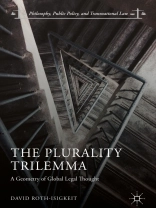This book provides a comprehensive introduction to global legal thought. It argues that economic globalization and digitalization have induced significant insecurity about the future of human social organization. While traditional international law as a system based on the consent of national states is in the process of rapid adaptation to its new social preconditions, a variety of transnational regulatory levels compete for legal authority. In this process of change, there is more need than ever to guide the theoretical understanding because academic concepts have a crucial influence on the emerging practice of global law. This book highlights which choices are available and argues that global law requires taking a stand in mutually irreconcilable choices.
Tabla de materias
1. Introduction: Theory, Practice, and Meta-Theory.- 2. Global Legal Thought and Plurality.- 3. Taming Plurality through Formal-Legal Rationality: Habermasian Approaches to Global Law.- 4. Unleashing Conflict: Post-Modern Luhmannian Approaches to Global Law.- 5. Process and Harmonizing Principles: Dworkinian Approaches to Global Law.- 6. The Plurality Trilemma – The Contingent Geometry of Global Legal Thought.- 7. Conclusion: Icarus.
Sobre el autor
David Roth-Isigkeit is Research Fellow at Normative Orders, Cluster of Excellence at Goethe University Frankfurt/Main, Germany.












